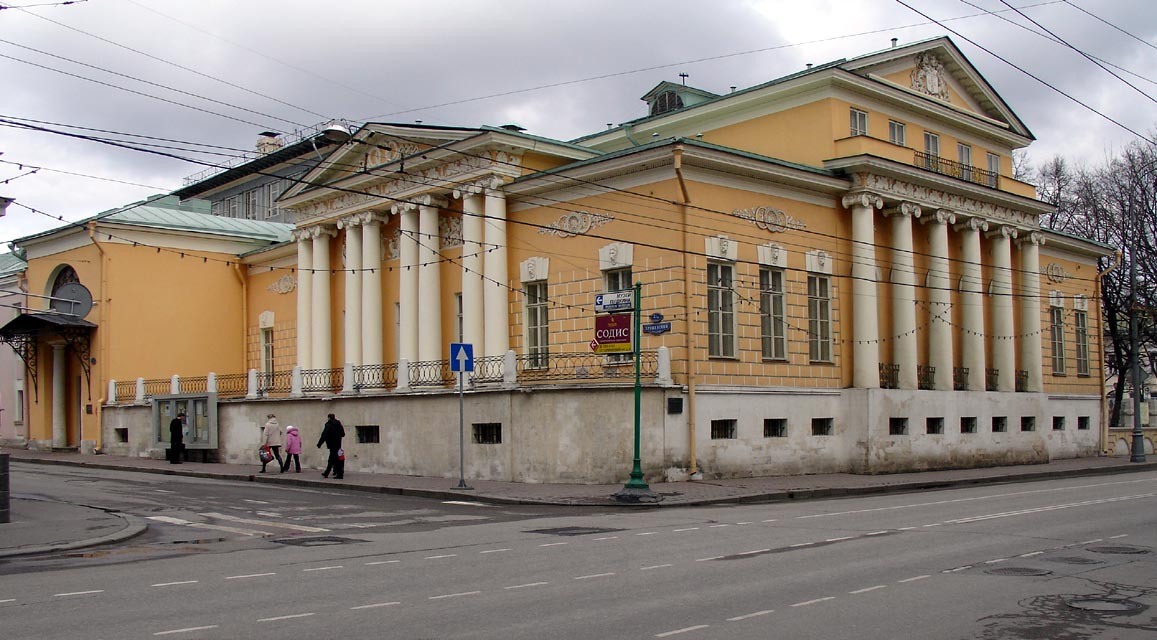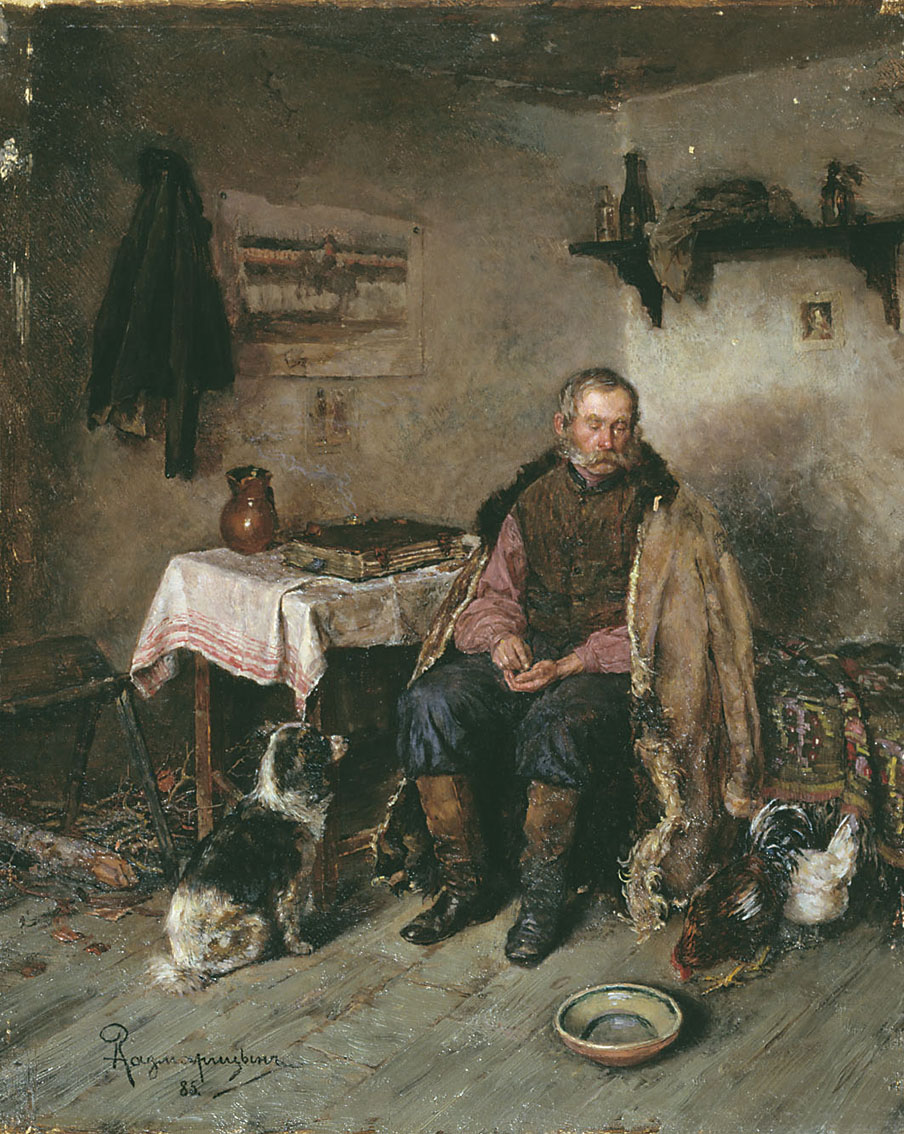|
Afanasy
Afanasy (russian: Афана́сий) is the Russian form of Athanasios, a Greek name meaning "immortal". It may refer to: People: * Afanasy Bagration, Prince Adarnase of Kartli (1707–1784), Georgian prince royal and Russian Empire general * Afanasy Beloborodov (1903–1990), Russian general * Afanasy Fet (1820–1892), Russian poet * Afanasy Grigoriev (1782–1868), Russian architect * Afanasy Nikitin (died 1472), Russian merchant and traveler * Afanasy Ordin-Nashchokin (1605–1680), Russian statesman * Afanasy Razmaritsyn (1844–1917), Russian-Ukrainian painter * Afanasy Seredin-Sabatin (1860–1921), Russian architect and journalist, first Western architect to live and work in the Korean Empire * Afanasy Shchapov (1830–1876), Russian historian Fictional people: * Afanasy Ivanovich Tovstogub, the main character of Nikolai Gogol's short story ''The Old World Landowners'' The surname Afanasyev (russian: Афана́сьев) is derived from the name. The surname Afonin Afon ... [...More Info...] [...Related Items...] OR: [Wikipedia] [Google] [Baidu] |
Afanasyev
Afanasyev (masculine; Афанасьев) or Afanasyeva (feminine; Афанасьева) is a Russian last name. It is derived from Afanasy which is etymologically directly connected to Athanasios (Αθανάσιος), a very common Greek masculine first name that means "immortal". As Russian last name it is shared by the following people: People * Aleksey Afanasyev (1850-), Russian painter and illustrator *Alexander Afanasyev (1826–1871), Russian folklorist *Alexander Afanasyev-Chuzhbinsky (1817–1875), Russian/Ukrainian writer and ethnographer * Alexey Ivanovich Afanasyev (1910–1978), Soviet naval officer and Hero of the Soviet Union * Alexey Nikolayevich Afanasyev (1916–1968), Soviet army officer and Hero of the Soviet Union *Anatoly Afanasyev (1912–2003), Soviet army officer and Hero of the Soviet Union *Fyodor Afanasyev (1859–1905), Russian revolutionary * Georgy Afanasyev (1906–1975), Soviet geologist and petrographer *Mikhail Afanasyev (born 1986), Belarusian fo ... [...More Info...] [...Related Items...] OR: [Wikipedia] [Google] [Baidu] |
Afanasy Fet
Afanasy Afanasyevich Fet ( rus, Афана́сий Афана́сьевич Фет, p=ɐfɐˈnasʲɪj ɐfɐˈnasʲjɪvʲɪtɕ ˈfʲɛt, a=Ru-Afanasiy Afanas'yevich Fyet.oga), later known as Shenshin ( rus, Шенши́н, p=ʂɨnˈʂɨn, a=Ru-Afanasiy Afanas'yevich Shinshin.oga; – ), was a renowned Russian literature, Russian poet regarded as the finest master of lyric verse in Russian literature. Biography Afanasy Fet was born on 5 December 1820 to Afanasy Shenshin, a 44-year-old Russian landlord from Mtsensk, and Charlotte Becker, a 22-year-old daughter of Karl Becker, a Germany, German inn-keeper. While staying with them during his visit to Germany, Shenshin fell in love with Charlotte, who agreed to follow him to Russia. Pregnant with her second child, she divorced her husband Johann Foeth, a Darmstadt court official, and married her Russian suitor, but was forced to leave her one-year-old daughter Carolina behind.Later Carolina Foeth too came to Russia where she married Al ... [...More Info...] [...Related Items...] OR: [Wikipedia] [Google] [Baidu] |
Afanasy Nikitin
Afanasy Nikitin (russian: Афана́сий Ники́тин; died 1472) was a Russian merchant from Tver and one of the first Europeans (after Niccolò de' Conti) to travel to and document his visit to India. He described his trip in a narrative known as '' The Journey Beyond Three Seas'' (russian: Хождение за три моря, ''Khozhdeniye za tri morya''). The voyage In 1466 Nikitin left his hometown of Tver on a commercial trip to India. He travelled down the Volga River, and although Tatars attacked and robbed him near Astrakhan, he succeeded in reaching Derbent, where he joined Vasili Papin, the envoy of Ivan the Great (the Grand Prince of All Rus') to the shah of Shirvan. At Derbent, Nikitin vainly endeavoured to find means of returning to Russia; failing in this, he went on to Baku and later to Persia proper by crossing the Caspian Sea. This provides a more detailed itinerary of his outward and return journeys. He lived in Persia for one year. In the spring of 1 ... [...More Info...] [...Related Items...] OR: [Wikipedia] [Google] [Baidu] |
Prince Adarnase Of Kartli
Afanasy Bagration ( ka, ათანასე ბაგრატიონი, ''At'anase Bagrationi''; russian: Афанасий Леонович Багратион, ''Afanasiy Leonovich Bagration''), born Adarnase (ადარნასე) (15 November 1707 – 31 March 1784) was a Georgian prince royal (''batonishvili'') of the Bagrationi dynasty of House of Mukhrani of Kartli and a natural son of Levan of Kartli by a concubine. He followed, in 1724, his half-brother King Vakhtang VI of Kartli in an exile to the Russian Empire, where Afanasy pursued a military career and attained to the rank of general poruchik. Career Afanasy Bagration, born Adarnase, was a natural son of Levan (Shah Quli Khan), prince-regent of Kartli in eastern Georgia and a titular king in 1709. His early life in Kartli is poorly documented. In 1724, he arrived in Russia in the entourage of his half-brother Vakhtang VI (Husayn Quli Khan), who had lost his throne to the Ottoman invasion. Adarnase, now know ... [...More Info...] [...Related Items...] OR: [Wikipedia] [Google] [Baidu] |
Afanasy Ordin-Nashchokin
Afanasy Lavrentievich Ordin-Nashchokin (russian: Афанасий Лаврентьевич Ордин-Нащокин) (1605–1680) was a Russian statesman of the 17th century. He was the first junior noble to attain the '' boyar'' title and highest offices of state not as a result of family connections but due to his personal capabilities and achievements. Early life and career Afanasy Ordin-Nashchokin was the son of a poor official from Pskov, who saw to it that his son was taught Latin, German and mathematics. Ordin-Nashchokin began his public career in 1642 as one of the officials involved in determining the new Russo-Swedish frontier after the peace of Stolbovo. By that time, he had gained a reputation in Russia as having a thorough understanding of "German ways and things". He was one of the first Muscovites who diligently collected foreign books; according to one source as many as sixty-nine Latin works were sent to him at one time from abroad. This cites: * Sergey So ... [...More Info...] [...Related Items...] OR: [Wikipedia] [Google] [Baidu] |
Afanasy Grigoriev
Afanasy Grigorievich Grigoriev (russian: Афанасий Григорьевич Григорьев) (21 January 1782 – 13 May 1868) was a Russian Neoclassical architect, who worked in Moscow and its suburbs. Grigoriev is remembered for his refined Empire style mansions, completion of Great Ascension Church (which, unfinished, housed the wedding of Alexander Pushkin in 1831) and assistance to Domenico Gilardi in rebuilding Moscow after the Great Fire of 1812. Biography Grigoriev was born a serf, owned by the Kretov family, and acquired freedom at the age of 22. By this time, he was a long-time apprentice to Moscow-based Gilardi family of Swiss architects. Giovanni Gilardi was the chief architect of continuously expanding Moscow Orphanage, Widow's House (public almshouse) and Catherine's Institute; his son, Domenico Gilardi, inherited the family practice and managed rebuilding of these and other public structures after the devastating Fire of 1812. Grigoriev, like Domeni ... [...More Info...] [...Related Items...] OR: [Wikipedia] [Google] [Baidu] |
Afanasy Beloborodov
Afanasy Pavlantyevich Beloborodov (russian: Афанасий Павлантьевич Белобородов; – 1 September 1990) was general in the Red Army during the Second World War who was twice awarded the title Hero of the Soviet Union. Between 1963 and 1968, he commanded the Moscow Military District. Early life Beloborodov was born on in the Siberian village of Akinino to a family of Russian peasant farmers. Having completed only three grades of school, he joined the a partisan detachment at the age of sixteen and participated in the Irkutsk uprising. In 1920 the unit became incorporated into the 8th Irkutsk Rifle Regiment of the 1st Chita Rifle Division. He left the army that year, but re-enlisted in 1923. In 1926 he graduated from Nizhny Novgorod Infantry School and was appointed commander of a rifle platoon of the 6th Khabarovsk Rifle Regiment of the 2nd Priamur Rifle Division. He completed his military and political training in 1929, upon which he was made politi ... [...More Info...] [...Related Items...] OR: [Wikipedia] [Google] [Baidu] |
The Old World Landowners
"The Old World Landowners" (Старосветские помещики, ''Starosvyetskiye pomeshchiki''), a short story written in 1835, is the first tale in the Mirgorod collection by Nikolai Gogol. A bittersweet and ironic reworking of the Baucis and Philemon legend from Ovid's ''Metamorphoses'', it is a simple story that represents the mature Gogol and hints at his later works. Plot Gogol opens by providing a romantic description of landowners in the countryside, giving particular attention to minute details. The two landowners, Afanasy Ivanovich Tovstogub and Pulkheriya Ivanovna Tovstogubikha live peacefully together in a remote village. The descriptions of them fit into the Slavophile tradition, comparing them strikingly against urban Little Russians (Ukrainians), particularly in Saint Petersburg, who are referred to as "paltry contemptible creatures" (because they acquire wealth dishonorably and conceal their descent by changing their last names to sound like Great Russians ... [...More Info...] [...Related Items...] OR: [Wikipedia] [Google] [Baidu] |
Athanasios (other)
Athanasios ( el, Αθανάσιος), also transliterated as Athnasious, Athanase or Atanacio, is a Greek male name which means "immortal". In modern Greek everyday use, it is commonly shortened to Thanasis (Θανάσης), Thanos (Θάνος), Sakis (Σάκης), Nasos (Νάσος), Athan (Αθαν) or Athos (Aθως). The female version of the name is Athanasia (Greek: Αθανασία), shortened to Sia (Σία) or Nancy (Νάνσυ) Notable people with this name include: Religious figures * Athanasius of Alexandria (ca. 296/298–373), Christian saint, Coptic pope, theologian * Pope Athanasius II of Alexandria (died 496), Coptic pope from 490 to 496 * Athanasius I Gammolo (died 631), Patriarch of Antioch, and head of the Syriac Orthodox Church of Antioch from 595 until his death * Athanasius II Baldoyo (died 686), Patriarch of Antioch, and head of the Syriac Orthodox Church from 683 until his death * Athanasius Sandalaya, Patriarch of Antioch, and head of the Syriac Orth ... [...More Info...] [...Related Items...] OR: [Wikipedia] [Google] [Baidu] |
Afanasy Razmaritsyn
Afanasy Prokopievich Razmaritsyn (Russian: Афанасий Прокопиевич Размарицын; 1844 in Ukraine? – 1917 in Odessa) was a Russian-Ukrainian historical genre painter; associated with the Peredvizhniki. Biography He was born to a noble family, probably somewhere in Ukraine. Originally, he was employed at the Odessa office of the State Bank of the Russian Empire. He was fond of making pencil sketches of his friends, who told him he should take up art professionally.Biographical note @ ArtCyclopedia. In 1874, he left the civil service and went to , where he showed his work to Professor |
Afanasy Seredin-Sabatin
Afanasii Ivanovich Seredin-Sabatin (Афанасий Иванович Середин-Сабатин) was a Russian steersman-pilot and reporter for an English newspaper, but is best known as the first European (Russian) architect to live and work in the Korean Empire from (approximately) 1890 to 1904. He built a number of palaces in European style within the city of Seoul. He also built the first Russian Legation building, also in the city of Seoul. This building is a historical site because shortly after the Japanese invasion of Korea, in 1895, when the Korean Queen Min was assassinated by the Japanese, King Gojong and his son were given refuge in the Russian Legation for a year. Biography Ancestry Afanasii’s father: Ivan Vassilievich Seredin-Sabatin. Was of noble birth, landed gentry, of the province of Poltava, Ukraine, where the family owned an estate, with serfs. They lived in the town of Lubny, in the same province, where they also owned properties. Afanasii� ... [...More Info...] [...Related Items...] OR: [Wikipedia] [Google] [Baidu] |
Afanasy Shchapov
Afanasiy Prokopievich Shchapov (''Афанасий Прокофьевич Щапов'' in Russian) (May 10(17).1830 – February 27(10.3).1876) was a Russian historian accused of " Siberian nationalism" and persecuted by tsarist authorities. Life Afanasiy Shchapov was born in the village of Anga some 210 miles from Irkutsk, into a family of a Russian sexton and Buryat peasant woman. Educated in Irkutsk, he moved to Kazan and became a student at Kazan Theological Academy (1852–1856). Upon receiving his bachelor's degree, Shchapov began to deliver lectures on Russian history at his alma mater (1856–1860) and later at Kazan University (1860–1861). He also studied the Solovetsky Monastery library, which had been evacuated during the Crimean War to Kazan. Fascinated with the Solovetsky Uprising, Shchapov started writing articles about the Raskol and Old Believers. On April 16, 1861, he delivered a revolutionary speech dedicated to the victims of the Bezdna Unrest, a ... [...More Info...] [...Related Items...] OR: [Wikipedia] [Google] [Baidu] |


.jpg)



